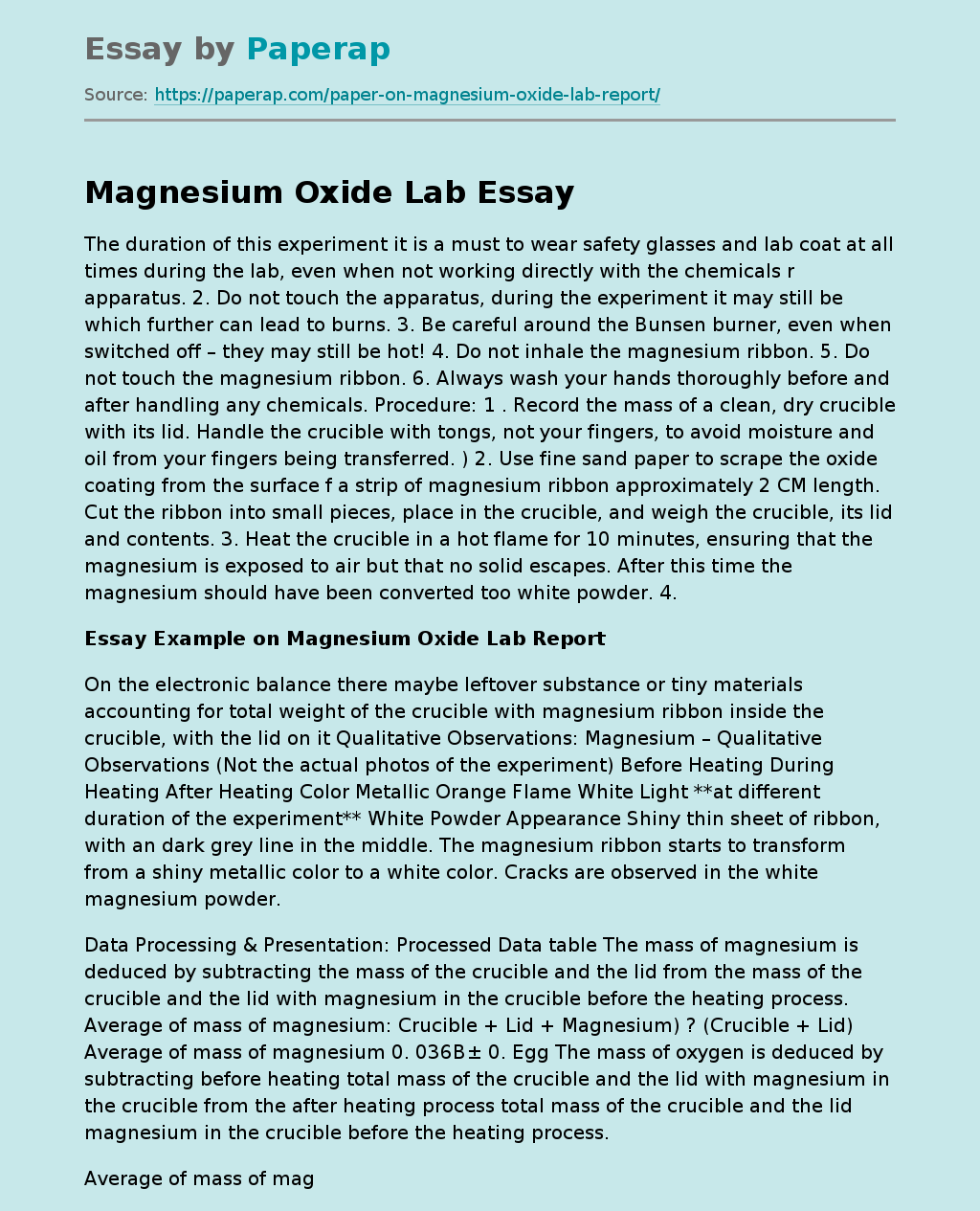Magnesium Oxide Lab
The duration of this experiment it is a must to wear safety glasses and lab coat at all times during the lab, even when not working directly with the chemicals r apparatus. 2. Do not touch the apparatus, during the experiment it may still be which further can lead to burns. 3. Be careful around the Bunsen burner, even when switched off – they may still be hot! 4. Do not inhale the magnesium ribbon. 5. Do not touch the magnesium ribbon. 6. Always wash your hands thoroughly before and after handling any chemicals.
Procedure: 1 . Record the mass of a clean, dry crucible with its lid. Handle the crucible with tongs, not your fingers, to avoid moisture and oil from your fingers being transferred. ) 2. Use fine sand paper to scrape the oxide coating from the surface f a strip of magnesium ribbon approximately 2 CM length. Cut the ribbon into small pieces, place in the crucible, and weigh the crucible, its lid and contents. 3. Heat the crucible in a hot flame for 10 minutes, ensuring that the magnesium is exposed to air but that no solid escapes.
After this time the magnesium should have been converted too white powder. 4.
Essay Example on Magnesium Oxide Lab Report
On the electronic balance there maybe leftover substance or tiny materials accounting for total weight of the crucible with magnesium ribbon inside the crucible, with the lid on it Qualitative Observations: Magnesium – Qualitative Observations (Not the actual photos of the experiment) Before Heating During Heating After Heating Color Metallic Orange Flame White Light **at different duration of the experiment** White Powder Appearance Shiny thin sheet of ribbon, with an dark grey line in the middle.
The magnesium ribbon starts to transform from a shiny metallic color to a white color. Cracks are observed in the white magnesium powder.
Data Processing & Presentation: Processed Data table The mass of magnesium is deduced by subtracting the mass of the crucible and the lid from the mass of the crucible and the lid with magnesium in the crucible before the heating process. Average of mass of magnesium: Crucible + Lid + Magnesium) ? (Crucible + Lid) Average of mass of magnesium 0. 036В± 0. Egg The mass of oxygen is deduced by subtracting before heating total mass of the crucible and the lid with magnesium in the crucible from the after heating process total mass of the crucible and the lid magnesium in the crucible before the heating process.
Average of mass of magnesium = 0. 02 grams Conclusion & Evaluation: Conclusion: Evaluation: = 00000 x 100 Random error is an error in measurement caused by factors that vary from one measurement to another. When the crucible was weighed with the lid and with r without the substances, we should of kept the same person weigh to keep a constant circumstance and methods used during the experiment and the electronic balancer should be kept the same, to reduce any random error by changing the electronic balancer.
Repeat measurements during experiments, to reduce random error enough to get a normal distribution. Mean values will be close to the actual value, which helps reduce random error. Systematic error is where something has gone wrong with the measuring device or method. To reduce systematic error we should apply the correct methods and be thorough tit the procedure for the experiment, be aware requirements of the lab and take precaution during the lab with methods applied during the experiment.
To determine systematic error it most obvious in a graph within outlier in the graph. Outlier represents the systematic error. In this case if I were to determine a systematic error during the lab I would consider making a graph which would represent the data collected during the experiment. I should keep these systematic and random errors in my mind when conducting my next experiment to stop these errors to occur again in the experiment.
Magnesium Oxide Lab. (2019, Nov 27). Retrieved from https://paperap.com/paper-on-magnesium-oxide-lab-report/

